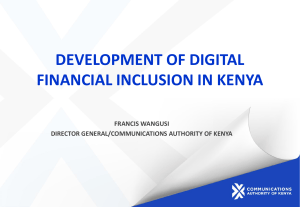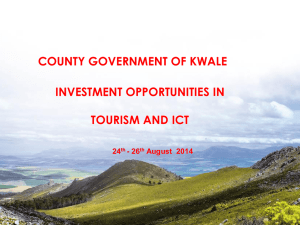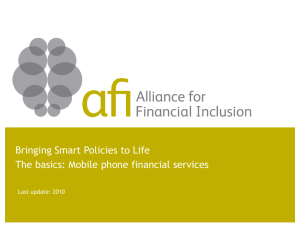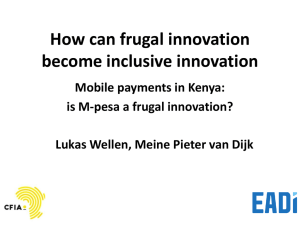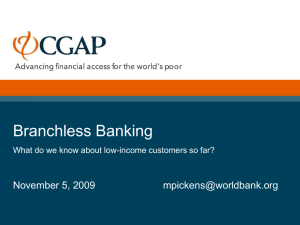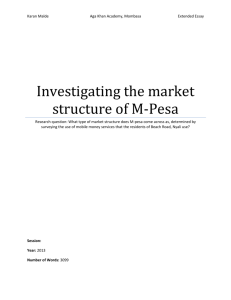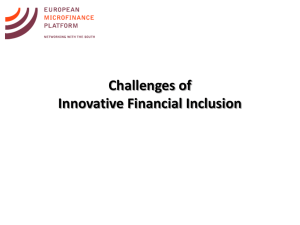Safaricom M-Pesa Mobile Money Service Overview
advertisement
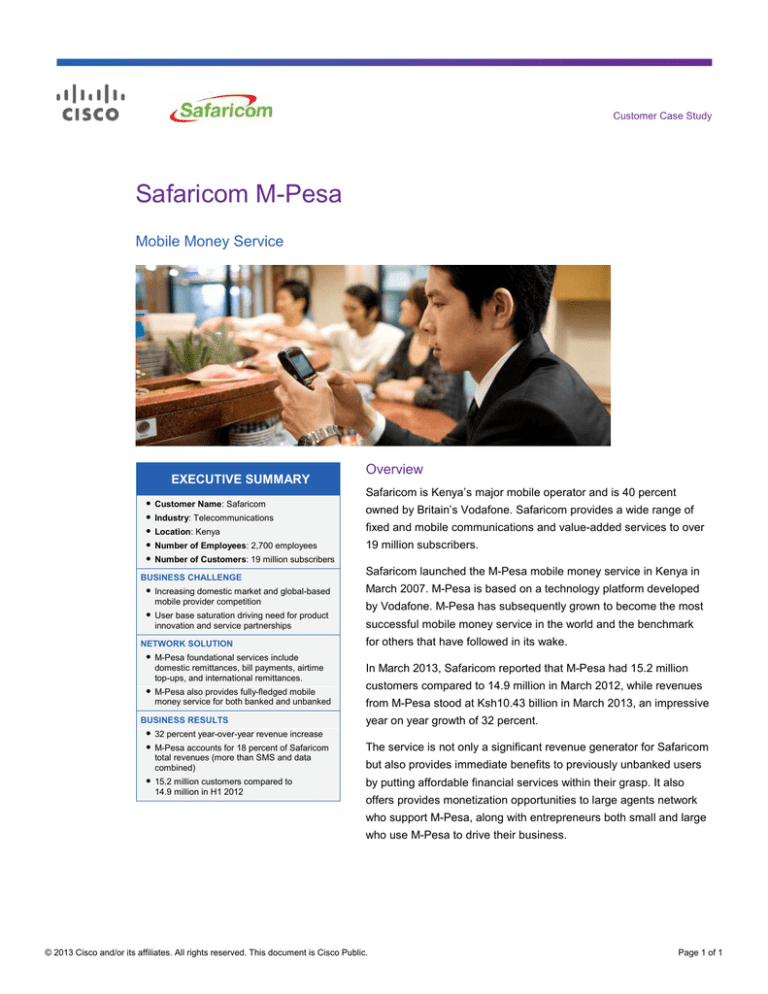
Customer Case Study Safaricom M-Pesa Mobile Money Service EXECUTIVE SUMMARY Overview Safaricom is Kenya’s major mobile operator and is 40 percent ● Customer Name: Safaricom ● Industry: Telecommunications ● Location: Kenya ● Number of Employees: 2,700 employees owned by Britain’s Vodafone. Safaricom provides a wide range of fixed and mobile communications and value-added services to over 19 million subscribers. ● Number of Customers: 19 million subscribers BUSINESS CHALLENGE ● Increasing domestic market and global-based mobile provider competition ● User base saturation driving need for product innovation and service partnerships Safaricom launched the M-Pesa mobile money service in Kenya in March 2007. M-Pesa is based on a technology platform developed by Vodafone. M-Pesa has subsequently grown to become the most successful mobile money service in the world and the benchmark NETWORK SOLUTION ● M-Pesa foundational services include domestic remittances, bill payments, airtime top-ups, and international remittances. ● M-Pesa also provides fully-fledged mobile money service for both banked and unbanked for others that have followed in its wake. BUSINESS RESULTS ● 32 percent year-over-year revenue increase year on year growth of 32 percent. ● M-Pesa accounts for 18 percent of Safaricom total revenues (more than SMS and data combined) ● 15.2 million customers compared to 14.9 million in H1 2012 In March 2013, Safaricom reported that M-Pesa had 15.2 million customers compared to 14.9 million in March 2012, while revenues from M-Pesa stood at Ksh10.43 billion in March 2013, an impressive The service is not only a significant revenue generator for Safaricom but also provides immediate benefits to previously unbanked users by putting affordable financial services within their grasp. It also offers provides monetization opportunities to large agents network who support M-Pesa, along with entrepreneurs both small and large who use M-Pesa to drive their business. © 2013 Cisco and/or its affiliates. All rights reserved. This document is Cisco Public. Page 1 of 1 Service Innovation Safaricom has developed M-Pesa gradually, starting with foundation services that include domestic remittances, bill payments, airtime top-ups, and international remittances. M-Pesa has subsequently evolved to become a fully-fledged mobile money service for both the banked and unbanked that includes: ● ATM cash withdrawals ● Saving accounts, such as the M-Kesho account launched with Kenya’s Equity Bank, paying interest and offering insurance and credit facilities to users. ● On premise, retail payments through the Nunua na M-PESA (Buy Goods) service, enabling subscribers to pay selected retailers such as Uchumi and Naivas supermarkets using M-Pesa. ● Mobile-ticketing booking and payment service for concerts and events. ● M-Pesa included in Safaricom’s popular Bonga loyalty program, so M-Pesa users can earn points on chargeable transactions that can be redeemed for Safaricom telecom products and also air miles. ● Safaricom also offers corporate M-Pesa accounts that have higher transaction limits than for individual consumers. Corporate account holders can use M-Pesa to make bulk B2C payment and they can also receive funds and bill payments from individual M-Pesa users. Opportunities The majority of M-Pesa’s revenues are driven by Person-2-Person transactions, but opportunities exist for M-Pesa to grow more revenues from Business-2-Consumer (B2C) and Consumer-2-Business (C2B) transactions. M-Pesa’s H1 2012/13 results show that it is starting to make progress with the latter as C2B transactions accounted for 7.4 percent of value transferred and B2C contributed 5.5 percent. M-Pesa also has opportunities to grow revenues from on-premise retail payments, where it so far has only a basic offering. This initial offering is expected to expand as Safaricom develops a more comprehensive long-term proximity payments strategy. Vodafone, which developed the M-Pesa platform and is a major stakeholder in Safaricom, has ambitions to expand the M-Pesa service across its emerging market footprint. Besides Kenya, M-Pesa has now been deployed across Vodafone operations in Afghanistan, Qatar, South Africa, Fiji, the Democratic Republic of Congo, Tanzania and, most recently, India. ● M-Pesa has had notable success in Tanzania, where Vodacom Tanzania had 3.6 million M-Pesa customers out of its 11.6 million mobile subscribers as of June 2012, representing a mobile money penetration rate of 31 percent. Challenges M-Pesa faces increased competition, both in its domestic market and those into which it is expanding including South Africa and India. M-Pesa faces competition not only from other mobile operators but also a growing number of other players entering the mobile money market, for example M-Check in India and Wizzit in South Africa. At the same time, powerful global online groups such as Google and PayPal are aggressively pushing into mobile payments, as are global payment networks/credit card brands, notably Visa and MasterCard. © 2013 Cisco and/or its affiliates. All rights reserved. This document is Cisco Public. Page 2 of 4 In addition, although M-Pesa’s user base in Kenya is still growing, this growth will be more challenging in the future as the number of users approaches saturation: Close to 16 million of Safaricom’s total 19 million subscribers are now M-Pesa users. This means that Safaricom will need to work harder on increasing usage and engagement within the existing customer base. This will require new product innovations and service partnerships. Strategic Partnerships Banking partners are the foundation of the M-Pesa service, and Safaricom has secured alliances with all the countries major banks, and has an agreement with Western Union for international money transfers. Safaricom is now seeking more retail partners to support its fledgling on-premise payment service. ● Banking partners include: Cooperative Bank, Kenya Commercial Bank, Barclays Bank, Equity Bank, Family Bank, NIC Bank, Post Bank, Consolidated Bank, Standard Chartered Bank, and CfC Stanbic Bank. ● Safaricom has also built up a strong, large, and motivated agent network to support M-Pesa, totaling 60,000 agents in 1H 2013. Agents are vital to the success of mobile money services in emerging markets because they undertake the critical task of converting cash to electronic money and vice versa, which is essential for low-income customers in cash-based economies. ● In addition, Safaricom has a global alliance with Western Union that allows M-Pesa customers to receive international money transfers from 45 countries and territories including the United States, Canada, Italy, and the United Kingdom. “M-Pesa, which is one of the world’s best financial innovations, has been a revelation in the country due to its reach and affordability, facilitating transfer of funds for a growing number of mobile telephone users.” —Martin Oduor-Otieno, Chief Executive, KCB Group Monetization/Success Metrics M-Pesa is based on simple, transparent business model that has proved to be highly effective. Safaricom and other operators supporting the service generate revenues via end-user transaction fees. The all-important agents that support M-Pesa are, in turn, paid a commission by Safaricom. No user fees are charged for registration, making deposits, or buying airtime, and only a nominal fee for of Ksh1 for balance inquiries. But most transfers and ATM withdrawals do incur charges that are on a sliding scale depending on the amount the user is sending or withdrawing; the larger the amount, the higher the fee. ● Banking services supported by M-Pesa also impose charges on end-users (costs vary from bank to bank), and Safaricom gains an undisclosed revenue share on these transactions. ● Safaricom revenues from M-Pesa user transaction fees are balanced against the commission that it must pay to agents supporting those transactions. © 2013 Cisco and/or its affiliates. All rights reserved. This document is Cisco Public. Page 3 of 4 Safaricom’s revenues from M-Pesa stood at Ksh 10.43 billion for the first six months of fiscal 2013, a year-on-year increase of 32 percent. (100 Ksh = ~1 USD). M-Pesa accounted for 18 percent of the operator’s total H1 2013 revenues of Ksh59.12 billion, a contribution that was more than SMS (8 percent) and data (7 percent) combined. Other M-Pesa success metrics reported in H1 2013 include: ● 15.23 million customers compared to 14.87 million in H1 2012 ● M-Pesa ARPU (Average Revenue Per User) at Ksh115, compared to Ksh92 for H1 2012 ● Ksh80 billion in transfers transacted between customers in September 2012, equivalent 31 percent of Kenya’s Gross Domestic Product (GDP). For More Information To find out more about the Safaricom M-Pesa service, go to www.safaricom.co.ke/personal/m-pesa/m-pesaservices-tariffs/relax-you-have-got-m-pesa. Printed in USA © 2013 Cisco and/or its affiliates. All rights reserved. This document is Cisco Public. FLGD11118 06/13 Page 4 of 4
